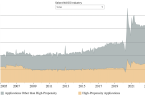There is another ngTLD in town as Google has started rolling out the .dev extension. The extension is intended for developers and those who produce products or services for the developer community. It is also an option for those who blog or consult about the development community. It will be interesting to see if it also finds use for development in the more general sense, for example economic and social development, or if it remains used primarily for developers of computer code.
EAP Pricing
As I write this the Early Access Program (EAP) period is taking place for the .dev extension. As with most new extension rollouts, this one has tiers at steadily decreasing prices. I list the levels based on information from Google here.
- Feb 19-20 $11,500 USD
- Feb 20-21 $3500 USD
- Feb 21-22 $1150 USD
- Feb 22-25 $350
- Feb 25-28 $125
In each case the period extends from 8:00 AM PST on the first date to 7:59 AM on the last. Pricing is for those who purchase through Google domains. Other registrars may charge slightly different prices.
Trademark holders were able to earlier register a domain name during the sunrise period from Jan 16 to Feb 19. If the nTLDstats page is up to date about 569 .dev had been registered during this period (a few of these, about 50, were reserved by Google so the real number is slightly less if you exclude that).
Surprisingly Facebook did not seem to claim FB.dev during the sunrise period. I did find a number that are already gone, supposedly at a high EAP price since they don’t seem to be trademarks, including the words ‘games’, ‘domain’ and ‘crypto’.
Regular Pricing
Sales at regular rates will commence at 8:00 AM PST on Feb 28. That pricing is at about $12 per year. You can check out specific pricing at different registrars using the TLD-List service. When I checked Porkbun had the best rate off $11.80, with Google Domains second at $12.00. Rates were not yet posted for some of the major registrars who will probably wait until the end of the EAP to prevent confusion.
Renewal Rates
On their site the registry say the following regarding renewal rates:
“During both the Early Access Program and General Availability, there is a $12/year cost for .dev domains. Annual fees may vary for Premium domains.”
I checked some different words and acronyms and found renewal rates at $1420, $720, $360, $180, $98, $56 and $12. There are probably other levels that I did not encounter. For example the word ‘fast’ (a high value word for .dev) is listed at $720 as is ‘perfect’ and ‘virtual’, while ‘integer’ shows a renewal rate of $180. The word ‘musical’ renews at $360 while ‘image’, a big term for developers, comes in at $1420 per year as does ‘VR’.
Most 3 letter combinations that I tried (that were not also high value short words) had $180 per year renewal rates, although a few were higher such as USA (which is still available, but with $720 per year renewal). I don’t know if these renewals will go down if the words are not claimed in EAP. I plan to recheck them later.
There are some possibly high value longer names that show standard renewal rates. For example, both ‘FuzzyLogic’ and ‘FogComputing’ came in at $12 even though they are terms for technologically important and developer related activities. I found a few others but decided not to publicly announce them :-)!
HSTS Preload List
One feature of .dev is that every domain is on the HSTS preload list. This means that HTTPS is required for all connections. and therefore a security certificate. You can learn more about HSTS preload in this DNWire podcast with Brent McIlwain of Google.
One option to get a security certificate without cost is Let’s Encrypt. Many hosting platforms provide automatic support. For example my personal domain website (NamesThat.win) is hosted by HostPapa and they have direct Let’s Encrypt support.
Early .dev Adopters
Just as they had for .app and .page, Google highlight a number of companies and organizations that are already up and running using a .dev domain name at the time of launch. There are some big names already onboard including the following.
- CodeAcademy (codecademy.dev)
- GitHub (GitHub.dev)
- Mozilla – MDN (mdn.dev)
- Slack (slack.dev)
- Stripe (stripe.dev)
- TensorFlow Hub (tfhub.dev)
- YCombinator (yc.dev — ycombinator.dev also works)
You can see other examples at their get.dev success stories page.
Prospects
If we look at other recent Google TLD releases, the .app extension has been at least a registration success. It currently stands at just shy of 370,000 registrations in 12th place among the almost 500+ released general availability ngTLDs. The more recent .page has been less successful, with currently just over 10,000 registrations and just inside the top 200 ngTLDs by registration.
In terms of the resale market, the NameBio database has 14 sales of .app with an average price of $4974. Some claim there are a huge number of .app sales in the Asian market which did not show up in NameBio. While the resale marke is less than some hoped, it is better than the first year in many new extensions. As far as I know there have not yet been any resales in the .page extension which has been in general availability for a shorter period.
The .dev is similar in terms of pricing to .page and .app, and all three require a security certificate. Most experts anticipate .dev will be somewhere between .page and .app in popularity. I would anticipate the resale market will be weaker for .dev compared to .app, although it may not be nearly as heavily speculated so that may partly compensate.




[…] Some big names had active sites at launch and many developers got basic sites up quickly. You can read my pre-launch article on the .dev extension here. As for .app and .page, .dev is a secure space requiring that all websites use https. […]